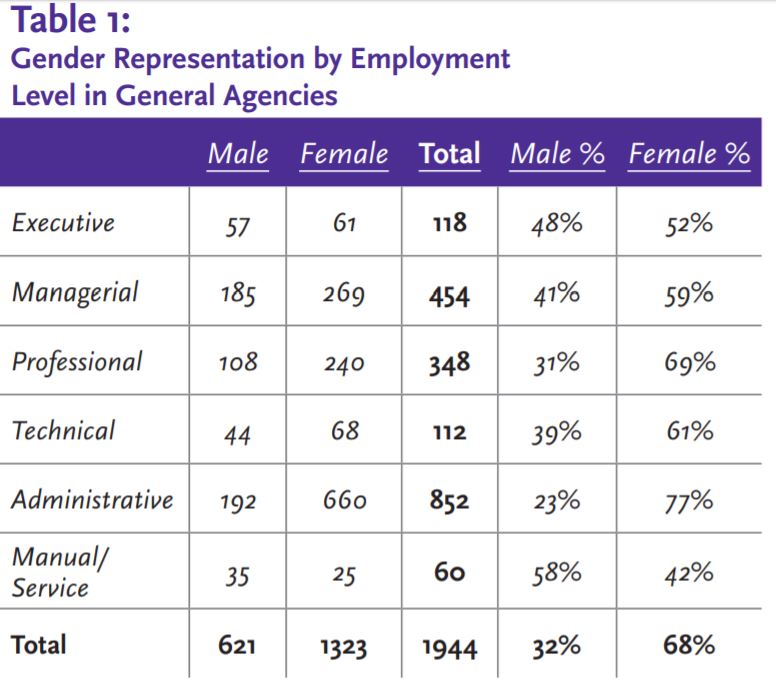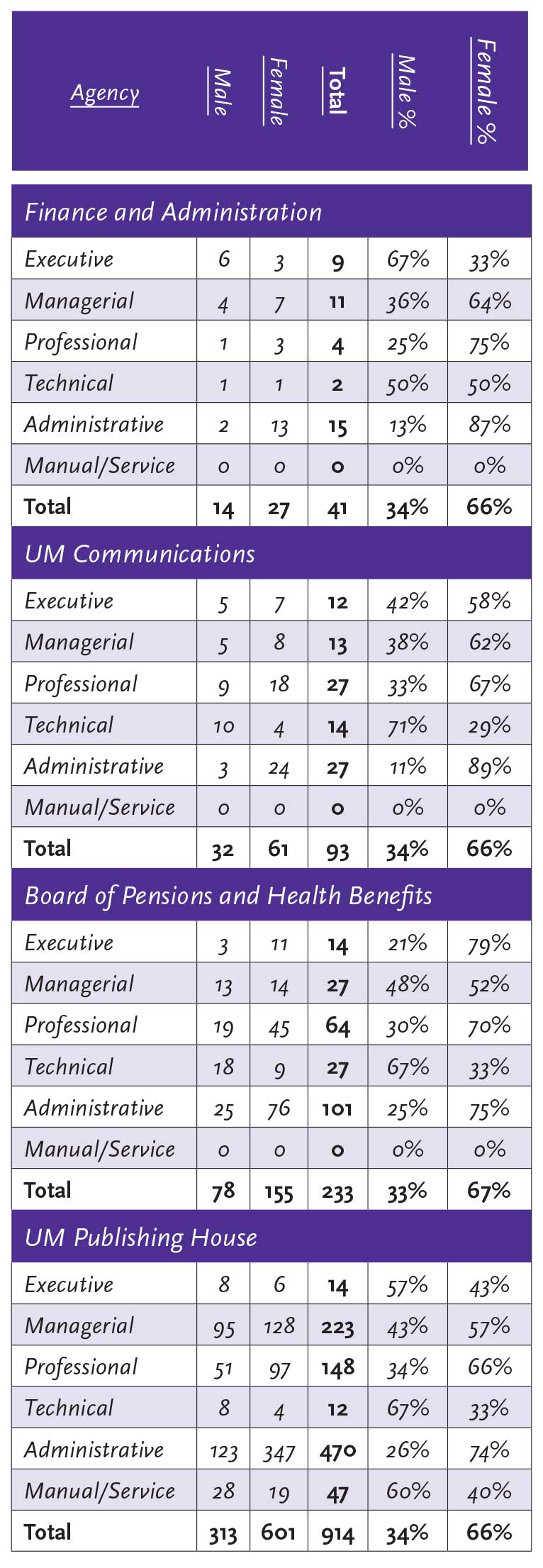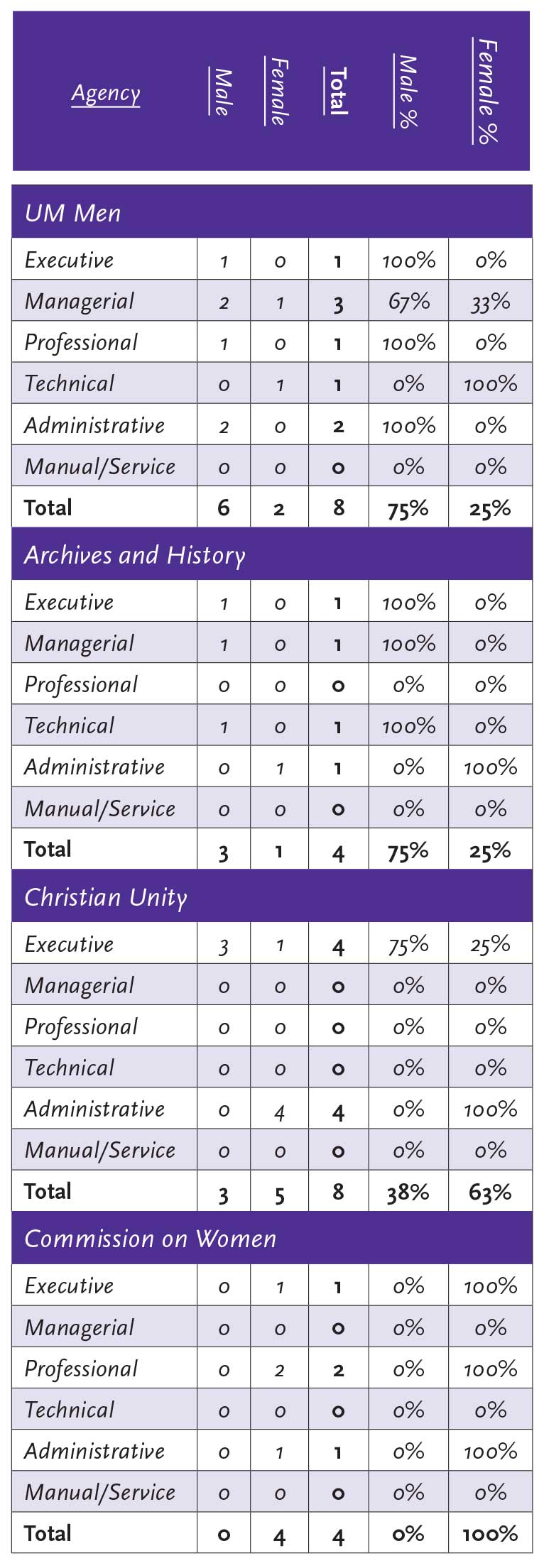By Craig This and Elaine Moy
Of the 1,944 individuals employed by the general agencies of The United Methodist Church, 68% (1,323) are women.
The findings for this report come from the 2006 Council, Board, or Commission Annual Members Profile jointly conducted by the General Commission on Religion and Race and the General Commission on the Status and Role of Women.
Overall, women are well-represented
Women, who are 58% of total United Methodist membership, hold more than half of the executive (52%), managerial (59%), technical (61%) positions and over two-thirds of the professional positions (69%) (see Table 1).
In some agencies women do not occupy a single position at the executive level. For example, only 4 of the 13 general agencies have a woman general secretary, and women hold a minority of the executive positions at the General Council on Finance and Administration (33%), United Methodist Publishing House (43%), General Board of Church and Society (0%), General Board of Discipleship (42%), General Commission on Archives and History (0%), General Commission on Religion and Race (0%), and General Commission on Christian Unity and Interreligious Concerns (25%) (see Table 2).
In this sense, women’s progress in the church mirrors that of the secular world in that women are being promoted to a certain level of leadership and responsibility, but they are not given as many opportunities at the highest management and administrative levels. A glass ceiling does exist for women in the church as it does in the secular world.
Not surprisingly, women hold 77% of the administrative and clerical support positions in the general agencies. The church often limits the leadership opportunities for women and tends to pigeonhole women in certain occupations.

Majority of women at four general boards
Of the four general program boards of The United Methodist Church, women occupy a majority of the positions. The General Board of Higher Education and Ministry has 83% women in its workforce. The General Board of Global Ministries employs women as 72% of its workforce. The General Board of Church and Society employs women as 57% of its workforce (see Table 2). The General Board of Discipleship—the only general program board which is led by a female general secretary—employs women as 74% of its workforce.
Despite these high numbers, women tend to occupy a greater percentage of the administrative, clerical, and support positions within these agencies than executive staff positions. While 55% of Global Ministries’ executive staff positions (6 of the 23 women executives are from Women’s Division) are held by women, more than three-fourths (79%) of its administrative and clerical positions are filled by women. Higher Education and Ministry has 67% of its executive staff positions and 100% of its administrative and clerical positions filled by women. Discipleship has 42% of its executive staff positions and 90% of its administrative and clerical positions filled by women. Church and Society has 40% of its managerial staff positions and 100% of its administrative positions filled by women.
General agency workforce
Clearly, while women have earned more leadership positions in recent years, there are some positions that are still seen as “women-only” (see Table 2).
The employment numbers of the general agencies stand in stark contrast to the number of women serving as members of the various boards and agencies.
Table 2 : Gender Representation by General Agency
(Each agency categorizes staff levels independently.)



Women and the commissions
The 2004 Book of Discipline, ¶703.2 &3, defines a general board as a continuing body of the church to carry out assigned functions or programs, administration, or service and a general commission as an organization for the fulfillment of a specific function for an indefinite period of time. Commissions have smaller staffs and budgets than do the general boards. As a result, calculating employment based on small numbers creates somewhat skewed results.
The Commission on Men and the Commission on Women are each charged by General Conference to focus on a specific ministry of men and women, respectively, in the church. As a result, 75% of the UMM workforce is male and 100% of the GCSRW workforce is female. That is to be expected.
Further, three of the general commissions—Archives and History, Christian Unity and Interreligious Concerns, and Religion and Race—have a greater percentage of men than women at their executive levels as compared with the general boards. However, when one looks closely, each of these commissions has 1, 4, and 1 executive positions, respectively, to fill, unlike the number of positions available with the general boards. (It should be noted that the General Commission on Religion and Race recently achieved an even distribution of men and women in the leadership level.)
Conclusion: So what does this all mean?
The employment numbers of women in the general agencies stand in stark contrast to the number of women serving as members of the various boards and agencies (see “Women aiming for national agency leadership often hit glass ceiling” The Flyer, October–December 2006). In that article, it was shown that although women are the majority in terms of overall church membership, they are not as well represented (45%) as members of agency governing councils, boards, and commissions.
The United Methodist Church at all levels has made strides in bringing women into full participation and leadership in our work and ministry. General agencies hire and promote women at a higher level than do some other entities in the church. Women are 68 of the general agency workforce, compared to only 22% of active bishops, 19% of active clergy, 37% of General Conference delegates, and 45% of voting members of general agency governing boards. It would seem that when it comes to empowering women, church-wide agencies overall are setting a strong example in answering the call to greater parity for women.
Craig This is a faculty member of the Department of Sociology, Geography, and Social Work at Sinclair Community College.
Elaine Moy is associate general secretary for finance and administration, GCSRW.
